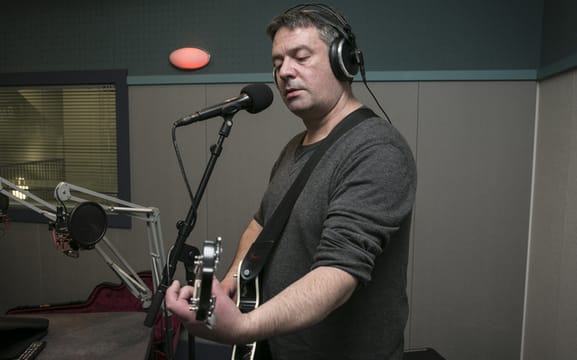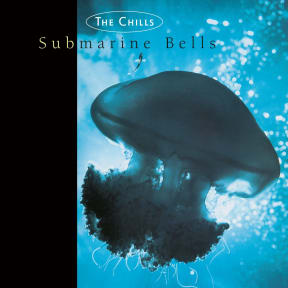
Martin Phillipps in The RNZ Wellington studio earlier this year Photo: Rebekah Parsons-King
Considered to be a defining album of the ‘Dunedin Sound’, Submarine Bells has become a seminal record and The Chills defining work.
Though it was recorded in the UK, it represents a turning point for the genre, the Flying Nun record label and the band.
It was released to critical acclaim in Britain, got heavy rotation on US college radio and remains the band’s biggest album.
Bandleader Martin Phillipps says the album represented a peak when, signed to a major label, and with a decent recording budget, The Chills were being groomed as the next REM.
Phillips doesn’t have to rely on his memory of that time, he’s been keeping a diary since 1983 and was looking back at the entries for the recording of the album in 1989 before chatting to Jesse Mulligan.
The album was recorded at Farnham Studios in Surrey on the outskirts of London.
“This was chance to stretch out with the available technology back then, which, according to my diary, was atrocious. Some sort of Akai programme that kept crashing with all our string arrangements.
“Everyone was getting sick, there were power cuts, there were late starts …”
Phillipps says although a creative time, recreational pursuits during the recording of Submarine Bells sometimes held up proceedings.
“I couldn’t believe how much we were drinking and smoking and stuff during the project too, which is not something we’d be doing these days at all.
“Looking back I think it hindered it, we were late for recordings most mornings. I think we probably lost a good couple of days overall just through everyone being hung over.”
The recording also took place during tumultuous time in his life
“My parents had separated briefly, the dog had died, my girlfriend had left me and Flying Nun was nearly going bankrupt.”
Nevertheless the album was critical triumph and by far the band’s most commercially successful release.
‘Heavenly Pop Hit’ from the album was number one on US College radio, and it got rave reviews in the British music press and general media.
After the album the band hit the road.

The Chills Submarine Bells Photo: Supplied
“That was probably the tightest the Chills ever was; that line up Justin Harwood on bass, Andrew Todd on keyboards and Jimmy Stephenson on drums.
“But we worked ourselves into a bit of a state really and just kind of collapsed.”
A New Zealand tour followed the exhausting world trek, Phillipps says.
“The biggest moment was the final homecoming tour, doing the town halls down through the country and the most wonderful thing of all after a world tour was stepping off the Dunedin Town Hall stage and going home to my own bedroom and falling asleep for like two days.”
Despite The Chills’ alternative credentials they were as hungry for commercial success as any other band, Phillipps says.
“The Chills thing kind of snowballed during the 80s, I thought that was going to happen, I thought there might be ups and downs but essentially we’d established ourselves as an act that you could trust.
“But nobody saw grunge coming and acid house, hip hop; all the different things that happened that really turned music on its head and made us look incredibly old fashioned very quickly.”
Twenty six years later, Phillipps gets a regular reminder of that time in Surrey recording Submarine Bell.
“I’ve just been down to my post box and I get a statement every six months from Warner Bros where for the last fifteen years I owe them $US425,000
“It stays on there because that’s the un-recouped Chills balance.”
He says the two albums recorded with Warner Bros Submarine Bell and Soft Bomb haven’t been available for years.
Despite this the album remains influential.
“It’s almost only now with hindsight we can see the impact that it made in terms of the other bands that now reference us,” Phillipps says.

